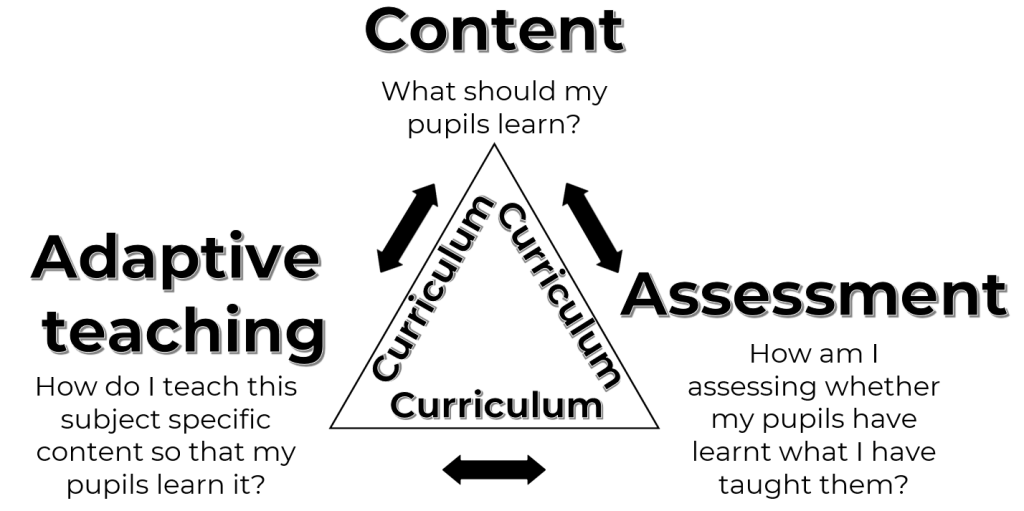Earlier this year I catalogued the many insights gleaned from educational experts which have been most influential in my curriculum thinking, in a post entitled, This much I know about… the principles of curriculum planning in action. In a series of short essays I am exemplifying in more detail ten of those influential insights, and explaining why I think they are so important to progressing pupils’ learning. This post explores Becky Allen's insight that curriculum is the complex, dynamic interplay between content, adaptive teaching and assessment, and if any one of these three curriculum pillars is out of kilter, the curriculum falls over like a badly made three-legged stool.

I go on a lot about what I have dubbed the “curriculum triumvirate”. Curriculum is the complex, dynamic interplay between content (what you want pupils to learn), adaptive teaching (how you teach pupils in a way that they best learn) and assessment (finding out whether they have learnt the content you have taught them). I have written in the past about the relationship between the three elements of curriculum in detail here.
When developing a unit of work, you need to think about all three elements of the triumvirate. If you just spend time on content – without thinking hard about how to teach that content in a way that pupils will learn it, and how to find out whether pupils have learnt what you have taught them and what to do if they haven't learnt it – you have only engaged in one third of the job of curriculum development.
When I interviewed her for the HEP Leadership 55 webinar, Professor Becky Allen pointed out that when curriculum, adaptive teaching and assessment work in harmony, they are as solid as a three-legged stool. If one of them is out of kilter, the curriculum makes learning difficult for pupils. Metaphorically, the three-legged curriculum stool falls over in these three circumstances…
- If the curriculum is too challenging or too easy, then no matter how good the teaching, all the assessment tells you is that the content is wrongly pitched.
- If the content is pitched perfectly, but it is taught in a way that children find it hard to learn, all the assessment tells you, in reality, is that the teaching is ineffective.
- If the content is pitched perfectly and is taught in a way that maximises learning, but the assessment is not challenging enough, or does not enable pupils to show what they have learnt, or does not assess the content you have taught, then you can't plan the next step of your teaching because you don't know whether pupils have learnt what you intended them to learn.
So, when you are developing the curriculum, make sure you consider all three elements of the triumvirate if you want to maximise learning, otherwise you know what'll happen...


On 14 December, Mary Myatt, Tom Sherrington and I will be in London, talking about what we have learnt over the years about the curriculum. The event is called: Curriculum Masterclasses: A Christmas Celebration! It is only £30 (to cover costs) and John Catt Education have thrown in a free book of your choice from the range of books the three of us have published. You can book a ticket here. Come and join us!

